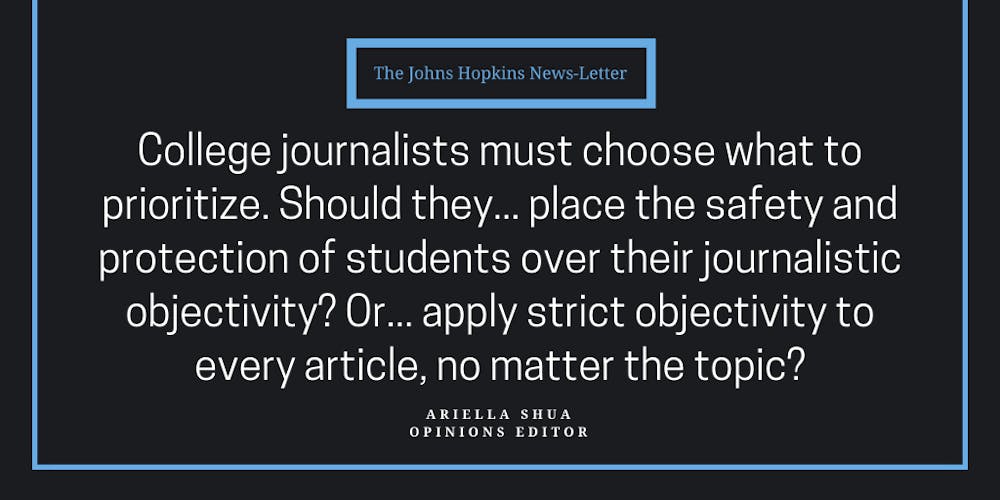I was quite surprised to hear that two news stories about college journalism were circulating this week.
The Harvard Crimson, the daily newspaper at Harvard University, has recently come under fire for its coverage of an anti-Immigration and Customs Enforcement (ICE) rally. The rally, held on Sept. 12, was hosted by student group Act on a Dream. The Crimson writers reached out to ICE for comment to be included in their article on the rally, though they did not respond.
One month later, Act on a Dream responded with a petition against The Crimson. They argued that The Crimson, by contacting ICE, could have compromised the safety of undocumented students on campus. The Crimson explained that they only shared publicly available information and that it is their policy to reach out to all parties of a protest for comment. Last week, a Crimson editor resigned in an act of dissent.
The Daily Northwestern, the newspaper at Northwestern University, had a nearly opposite experience. Former Attorney General Jeff Sessions spoke at the school on Nov. 5 amidst loud protests. The Daily reporters posted photos of the protesters and included the names of some protestors. When some of these students responded that they felt traumatized and at risk by direct references to them, The Daily removed the photos and the name of one protester. They issued an apology several days later.
The difference between the two approaches is striking. The Crimson says that journalistic integrity and objectivity is the priority of the paper. The Daily says that sharing information while protecting fellow students is the priority of the paper.
As these decisions are either criticized or praised, it is important to remember that trust in mass media is going down. According to a Gallup poll, only 13 percent of Americans trust the media “a great deal.”
Unfortunately, I am not part of that percentage. I wish that I could trust mainstream media, but I do believe that there are biases which creep into most articles at most publications.
There is one publication which I trust, however: The News-Letter.
I have now worked on The News-Letter for two and a half years. As I became more involved in the paper, I slowly came to appreciate the hours and hours it takes to produce each issue. Copy editing as a freshman taught me just how carefully each word is evaluated, and how important it is to fact check every little detail. Working as Your Weekend editor last year taught me how crucial it is to represent sources honestly. And working as the Opinions editor now teaches me, on a weekly basis, that writers care deeply about the meaning behind the words they put on the page.
I trust this journalistic system because I know that it works. I see my News-Letter colleagues hard at work, not just on production nights, but throughout the week. I am proud of what we do, not just because I’m involved but because I have seen the effort that everyone puts in to get it right. Writers, editors, photographers — everyone who contributes to an article takes steps to ensure that the stories are told the way they are meant to be told. We are transparent. We do make mistakes, but we attempt to fix them according to our policies.
As a result, I trust The News-Letter. It is where I go to find the latest news that impacts me — about Hopkins and about Baltimore. Sometimes, it tells stories about Hopkins that the University itself doesn’t want to share.
College journalists must choose what to prioritize. Should they use The Daily’s approach, and place the safety and protection of students over their journalistic objectivity? Or should they use The Crimson’s model, and apply strict objectivity to every article, no matter the topic?
I am proud to be a college journalist, and I commend those who do it across the country. Their coverage ensures that stories which otherwise may not have been told are revealed. But they must make sure that, if they are not going to be objective, they are honest in explaining why.
The Crimson, in reaching out to ICE for comment, upheld their own definition of journalistic integrity. These are their policies, they have been transparent with their readers, and they are not backing down. The Crimson chooses to keep their policies in place for each article, not to alter them for specific circumstances. That is commendable.
At the same time, The Daily, by issuing an apology for their coverage of the Sessions protests, upheld their own definition of journalistic integrity. They explained their reasons for choosing to protect student privacy going forward. They know that they cover a community in which the subjects of articles can be dramatically affected by their reporting. The Daily chooses to protect their fellow students. That too is commendable.
Revealing the truth is a tenet of journalism. Standing by fellow students is assumed in the community of a college campus. Journalists should not have to decide between the two. But if they have to choose, they must be transparent about which side they selected — and why they came to the decision.
Ariella Shua is a junior majoring in Writing Seminars from Livingston, New Jersey. She is the Opinions Editor.





